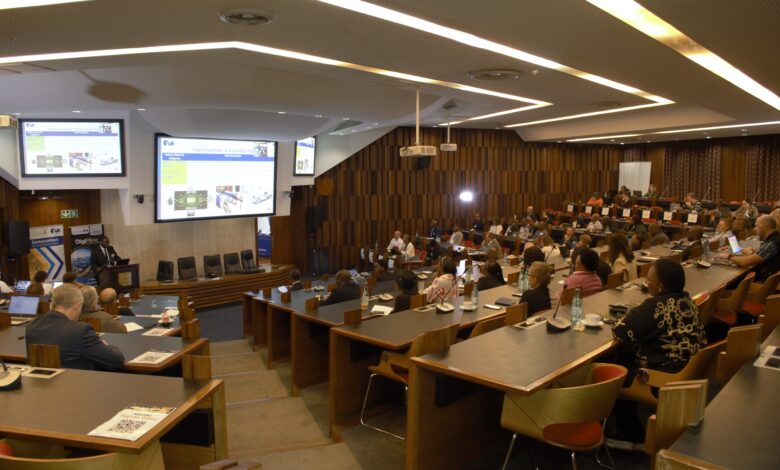The Wits Mining Institute (WMI), at the University of the Witwatersrand in Johannesburg, will be hosting a number of dynamic programmes during 2024 to assist the local and global mining industry to come to grips with emerging challenges.
The increasing use of mechanised and automated equipment at mine sites, as well as the ongoing focus on ESG and the need for spatial data, are some of the challenges the mining industry is facing. To address these topics and capitalise on opportunities, the WMI will work in collaboration with industry players to present short courses, equipping people to better tackle these challenges.
Speaking on the back of their first short course, titled ‘Fundamentals of Occupational Health and Safety in Practice’, offered to members of Sibanye Stillwater, WMI Director Professor Glen Nwaila highlighted that the Institute received only positive feedback from participants.
Held during the week of 11 March, the course catered to mine health and safety practitioners, as well as executives from Sibanye Stillwater. “This was a fully attended course,” he noted, adding that participants called the course a ‘game-changer.’
“This is one of those unique undertakings where a university designs a course based on direct input, feedback and collaboration with the mining industry to solve the problems that the practitioners face. Participants lauded the program’s focus on professionalising safety practices and fostering greater awareness of safety issues in mining operations,” he said.

WMI believes the course will allow these practitioners to build their capacity and skills in the industry. Led by a seasoned Mine Health and Safety Practitioner, Mr Terence Parker and Dr Nelson Chipangamate, participants were exposed to cutting-edge methodologies and real-world case studies aimed at enhancing their competence in safeguarding mining operations.
“Through collaboration with industry leaders like Sibanye Stillwater, we are reshaping the landscape of mining education,” said Nwaila “These skills accelerator programmes represent a pivotal step towards enhancing safety practices and driving innovation in the mining sector.”
Looking ahead
Due to overwhelming demand, the WMI and Sibanye Stillwater have committed to offering these programmes on an annual basis, opening the course to the rest of the industry from 2025 onwards.
Nwaila noted that there would also be a second intake for the Mine Health and Safety programme led by seasoned Mr Parker with a framework from Dr May Hermanus, running from 20 to 24 May 2024, while a third course, titled Mineral Value Chain for Occupational Health and Safety Practice, will be offered from 24 to 28 June 2024 and will be led by Dr Paskalia Neingo and Dr Pontsho Twala.
The curriculum is structured to accommodate two enrolments per year, with a focus on fundamental principles and advanced practices. Upon completion of all modules, participants will receive certificates endorsed by the University of the Witwatersrand, signalling their proficiency in occupational health and safety practices.
The WMI will also present a four-day online course from 20 to 24 May 2024 on ‘Mechanised Earthmoving in Mining: Equipment, Technology and Management’, which will be hosted by Professor Zvi Borowitsh, as well as a structured 21st Century Mining programme for Akita University (Japan) students funded by the United Nations University. This forms part of the Smart Mining programme.
The programme will be presented by WMI’s Head of DigiMine, Dr Ahsan Mahboob, WMI SAMERDI SATCAP Head, Dr Ingrid Watson, WMI’s Director Prof Glen Nwaila, and WMI’s post-doctoral fellows, Dr Nelson Chipangamate and Dr Mulundumina Shimaponda. The programme will endeavour to promote the development of core human and technological resources for smart mining to lead sustainable resource development in Southern Africa.
A flagship course
Recognising the increasing importance of spatial data management in both the mining and commercial sectors, the WMI is also offering an online course on Geographic Information Systems (GIS), being held on 25 September.
Presented by Dr Ahsan Mahboob and Dr Iqra Atif, the course will aim to equip participants with the skills necessary to harness the power of spatial intelligence.
The GIS course focuses on leveraging easy-to-access tools for spatial data analysis and visualisation, enabling participants to master Microsoft Excel for creating interactive maps, as well as to delve into the fundamentals of GIS. Attendees will gain invaluable insights into optimising resource allocation, locating and allocating employees, identifying mineral reserves, and enhancing operational efficiencies.
“In an era defined by rapid technological advancement and evolving industry trends, the WMI remains at the forefront of mining education. By curating these short courses, the WMI continues to pioneer the future of mining education, offering a transformative learning experience that equips participants with the skills needed to thrive in the 21st Century mining landscape.
“As the industry embraces digitalisation and mechanisation, we are standing ready to empower the next generation of mining professionals with the tools, knowledge, and expertise to drive innovation and shape the future of mining,” Nwaila said.
“The success of these courses underscores the importance of collaboration between academia and industry. Partnerships with leading mining companies, including Sibanye Stillwater, African Rainbow Minerals, Mandela Mining Precinct and Accenture, have been instrumental in shaping the curriculum and providing essential funding support,” he noted.
As part of its commitment to further advancing mining research and innovation, the WMI is also inviting industry stakeholders to engage in funding opportunities for two proposed research centres: Future Mines and Minerals and Intelligent Remote Operating Centre. These centres will focus on ESG-related research and the development of intelligent mining technologies, respectively, offering naming rights to sponsoring companies.
Engaging dialogue
Lastly, the WMI will also kick off its inaugural quarterly breakfast dialogue sessions starting on 4 April 2024. These sessions aim to address pressing challenges in the mining industry and expedite research transformation into practical industry solutions, leveraging the Awareness, Desire, Knowledge, Ability and Reinforcement, or ADKAR, change management model.


